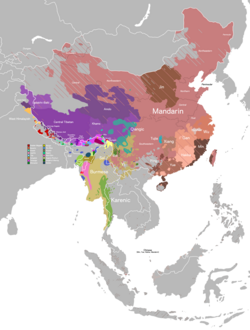You can help expand this article with text translated from the corresponding article in Chinese. (February 2016) Click [show] for important translation instructions.
|
| Taiwanese Hakka | |
|---|---|
| toiˇ vanˇ hagˋ gaˊ ngiˊ / toiˇ vanˇ hagˋ fa Thòi-vàn Hak-kâ-ngî / Thòi-vàn Hak-fa | |
| Pronunciation | Sixian: [tʰoi˩ van˩ hak̚˨ fa˥] Hailu: [tʰoi˥ van˥ hak̚˨ fa˩] Dapu: [tʰoi˧ van˩˩˧ kʰak̚˨˩ fa˥˧] Raoping: [tʰoi˧ van˥ kʰak̚˥ fa˨˦] Zhao'an: [tʰai˧ ban˥˧ kʰa˥ su˥] |
| Native to | Taiwan |
| Region | Taoyuan, Miaoli, Hsinchu, Pingtung, Kaohsiung, Taichung, Nantou, Changhua, Yunlin, Yilan, Hualien and Taitung |
| Ethnicity | Hakka Taiwanese |
| Speakers | L1: 330,000 (2020)[1] L2: 870,000 (2020)[2] Total: 1.2 million (2020)[3] |
| Dialects | |
| Latin (Pha̍k-fa-sṳ) | |
| Official status | |
Official language in | Taiwan[a] |
| Regulated by | Hakka Affairs Council |
| Language codes | |
| ISO 639-3 | – |
| ISO 639-6 | htia |
| Glottolog | None |
| Linguasphere | 79-AAA-gap |
 Proportion of residents aged 6 or older using Hakka at home in Taiwan, in 2010 | |
Taiwanese Hakka is a language group consisting of Hakka dialects spoken in Taiwan, and mainly used by people of Hakka ancestry. Taiwanese Hakka is divided into five main dialects: Sixian, Hailu, Dabu, Raoping, and Zhao'an.[7] The most widely spoken of the five Hakka dialects in Taiwan are Sixian and Hailu.[8] The former, possessing 6 tones, originates from Meizhou, Guangdong, and is mainly spoken in Miaoli, Pingtung and Kaohsiung, while the latter, possessing 7 tones, originates from Haifeng and Lufeng, Guangdong, and is concentrated around Hsinchu.[7][8] Taiwanese Hakka is also officially listed as one of the national languages of Taiwan. In addition to the five main dialects, there are the northern Xihai dialect and the patchily-distributed Yongding, Fengshun, Wuping, Wuhua, and Jiexi dialects.
Geographic distribution
[edit]
In 2014, 4.2 million Taiwanese self-identified as Hakka, accounting for 18% of the population.[9] The Hakka Affairs Council has designated 70 townships and districts across Taiwan where the Hakka account for more than a third of the total population, including 18 in Miaoli County, 11 in Hsinchu County, and another 8 in Pingtung, Hualien, and Taoyuan counties each.[9]
Status
[edit]With the introduction of martial law in 1949, the KMT-led government repressed Hakka, along with Taiwanese Hokkien and other indigenous languages in favor of Mandarin.[10] In 1988, the Hakka community established the Restore My Mother Tongue Movement to advocate for the right to use and preserve the Hakka language.[11] Language restrictions were relaxed after 1987 with the lifting of martial law and ensuing democratic reforms.[10] In 2012, the ministry-level Hakka Affairs Council was established to stem the language's decline in Taiwan.[12] In December 2017, the Legislative Yuan designated Hakka as an official national language of Taiwan.[13]
Sociolinguistics
[edit]While Hakka has official status in Taiwan, it has seen ongoing decline due to a language shift to the more dominant Taiwanese Mandarin and Taiwanese Hokkien.[14] The number of Hakka speakers in Taiwan has declined by 1.1% per year, particularly among youth.[12] In 2016, only 22.8% of self-identifying Hakkas aged 19 to 29 spoke the language.[15] Today, Taiwanese Hakka tends to be used within families and within local communities, which has reduced intergenerational transmission.[14] An estimated 2 million Hakkas now self-identify as Hoklo.[14] Furthermore, the great diversity of Hakka dialects used throughout Taiwan has impeded standardization of Hakka for teaching.[14]
See also
[edit]Notes
[edit]References
[edit]- ^ Taiwanese Hakka at Ethnologue (28th ed., 2025)

- ^ Taiwanese Hakka at Ethnologue (28th ed., 2025)

- ^ Taiwanese Hakka at Ethnologue (28th ed., 2025)

- ^ "Draft National Language Development Act Clears Legislative Floor". Focus Taiwan (CNA English News). Central News Agency. 25 December 2018.
- ^ "Dàzhòng yùnshū gōngjù bòyīn yǔyán píngděng bǎozhàng fǎ" 大眾運輸工具播音語言平等保障法 [Act on Broadcasting Language Equality Protection in Public Transport] (in Chinese) – via Wikisource.
- ^ "Standards for Identification of Basic Language Abilities and General Knowledge of the Rights and Duties of Naturalized Citizens" (PDF). Republic of China (Taiwan): Ministry of the Interior. Amended 9 April 2016. Article 6. Archived from the original on 25 July 2017. Accessed 20 July 2020.
- ^ a b "Distribution and Resurgence of the Hakka Language". Hakka Affairs Council. 16 July 2018. Retrieved 14 August 2019.
- ^ a b "Chapter 2: People and Language" (PDF). The Republic of China Yearbook. Republic of China (Taiwan): Government Information Office. 2010. p. 42. ISBN 9789860252781. Archived from the original (PDF) on 5 August 2011.
- ^ a b "Study of Hakka language to become mandatory in designated regions". Taipei Times. 25 June 2017. Retrieved 20 February 2024.
- ^ a b Waksman, Itamar (11 October 2021). "The fight for Taiwan's linguistic diversity". The China Project. Retrieved 20 February 2024.
- ^ "KMT Hakka language policy hypocrisy". Taipei Times. 6 November 2023. Retrieved 20 February 2024.
- ^ a b Van Trieste, John (24 December 2021). "Lawmakers call for law promoting the revival of the Hakka language". RTI.
- ^ Cheng, Hung-ta; Chung, Jake (30 December 2017). "Hakka made an official language". Taipei Times. Retrieved 20 February 2024.
- ^ a b c d Vollmann, Ralf; Soon, Tek Wooi (1 September 2022). "Convergence of Hakka with Chinese in Taiwan". Global Chinese. 8 (2): 211–229. doi:10.1515/glochi-2022-0008. ISSN 2199-4382.
- ^ Chan, Rosalie (25 January 2016). "Demographic shift spells language decline". Taipei Times. Retrieved 20 February 2024.
External links
[edit]- Taiwan MOE website on the Hakka Language.
- 臺灣客家語常用詞辭典 [Dictionary of Frequently-Used Taiwan Hakka] (in Traditional Chinese). Ministry of Education, R.O.C. 2016. Archived from the original on 28 December 2015. Retrieved 1 June 2017.

